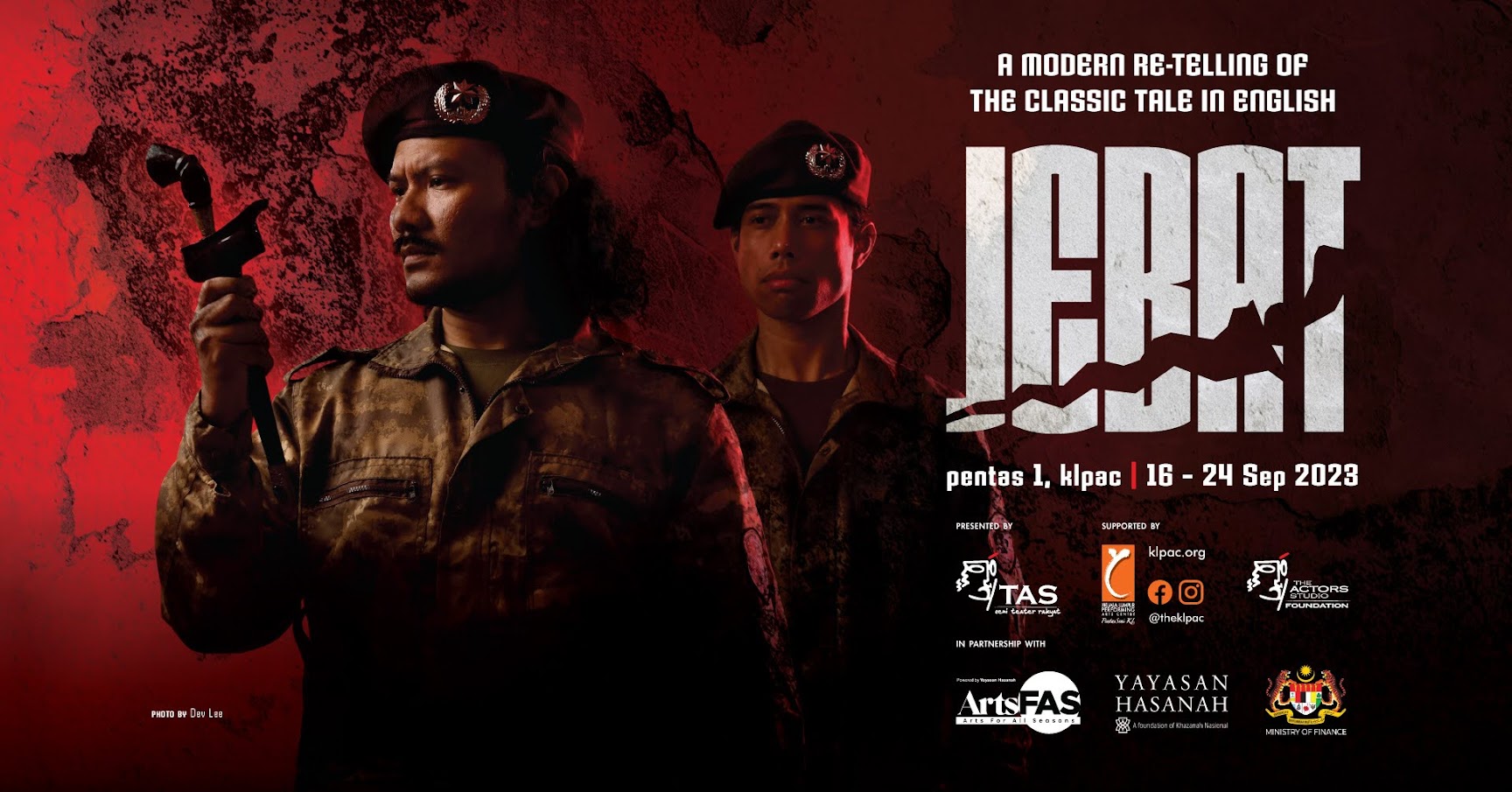The tale of Hang Jebat’s dissent against the Melaka Sultanate has often been reduced to a cautionary tale about the consequences of defying the second line of our country’s national pledge: Loyalty to king and country.
But what good is loyalty if it merely serves the corrupt or as Jebat would say, ‘yang zalim‘ (cruel)?
Hero, traitor, brother, lover – emblematic in this legend of crossing keris-es, silat, tyranny and tears – are interwoven into JEBAT by The Actors Studio, a re-telling of the Malay classic Hikayat Hang Tuah (Tales of Hang Tuah) now from Hang Jebat’s perspective.
Written by U-En Ng, directed by Joe Hasham and executive produced by Dato’ Dr. Faridah Merican, JEBAT which recently premiered at The KLPAC brings this classic hikayat (a tale) to the masses for the first time in English set, not during the Melaka Sultanate, but in a war-torn post-apocalyptic Malaysia.
While JEBAT delivers an action-packed, dramatic, highly detailed, and accessible rendition of the Hikayat, it fell short in softer aspects of world-building as well as expansion of some of the other characters who deserved more exploration alongside the titular character.
The set comprised of the ruins of a nondescript land. Large, chipped concrete beams loom over what struck me as ancient candi-inspired construct of stairs leading to a large, weathered throne at its apex.
The innovative use of AV projections scored to a blend of live electric guitar, serunai and gendang, blended contemporary with the mythical past quite successfully.
Casting and performances were simply brilliant.
Tanjaks off to Zul Zamir for an emotive, heartfelt performance as the title lead. Zamir deftly allowed his lines to breathe for his descent to be organic and believable.
Zamir’s raw, unbridled emotional Jebat was well matched by Yusuf Amin’s clean-cut Hang Tuah, whose rigid military movement and diction embodied the ideal loyalist in the court.
The epitome of a narcissistic, egomaniacal Sultan Mahmud Shah was memorably played by Sidhart Joe Dev.
Dev’s sardonic laughter presented a larger-than-life comic book villain perfectly countering the otherwise brooding, serious tone of the play.
Tying all the characters together was Ian Skatu’s Bendehara, struggling to keep the peace while doing right by those he loved.
Swarna Naidu as Dayang, Jebat’s (secret) love interest hinted at so much more. Her time on stage was limited and it was a shame that we didn’t get to see more of her journey.
The same could be argued for Davina Goh’s stern yet compassionate interpretation of Tun Teja (The Queen).
I would like to suggest a future ‘take’ on the Hikayat following these characters, who occupy under-represented identities of gender and social positions, whether in pre-colonial Melaka or post-apocalyptic Malaysia.
The supporting characters in JEBAT allowed us to feel greater depth and weight to the play’s central characters and their world at large.
Rounding up the Hang five are Faez Malek (Hang Lekir), Nabil Zakaria (Hang Kasturi) and Nick Augustine (Hang Lekiu).
Though understood as being there to provide exposition for Jebat and Tuah, they did well in demonstrations of camaraderie on and off the battlefield.
This was especially so when facing off the play’s secondary antagonist, the cunning Patih Kerma Wijaya superbly portrayed by the multi-faceted Anwar Rusdini.
Though fleeting, the exchanges and chemistry between Rusdini and the Hang brothers implied a hidden history.
JEBAT really delivers on-stage action. It features beautiful silat repertoires and meticulously-choreographed battle sequences. Movements were tight and concise, especially considering the layout of the set with many steps.
Costume design, down to each individual keris for the Hang five, was exemplary, especially when characters and props remained easily identifiable from a distance during the fight scenes.
The expansion of Jebat’s story, involving his relationship with Dayang and their unborn child introduced the third tension to the contended themes of loyalty and love. Through Dayang’s limited appearances, we see how duties as a lover and father-to-be become unfortunate casualties as a result of Jebat’s revolt and rage.
This does rob Dayang of her agency, as we see the same with Tun Teja. Understandably it can be a big ask to fully develop multiple characters especially given the challenge of re-adapting Hikayat Hang Tuah. Nevertheless, my hopes are that future renditions do better by their female characters.
As well put together and detailed as JEBAT seemed, its world-building left me with more questions than answers.
Though the play is set in what appears to be a post-apocalyptic Malaysia, yet there is no context or evidence of what conspired.
Historical revivalism in post-apocalyptic literature isn’t uncommon, but here it needed to be grounded in context. Otherwise, there is little to convince me that this couldn’t have simply been a restaging of the original during the Melaka sultanate.
The setting promised more than it would deliver. The use of projection for what seemed to suggest TikTok videos made the issue of the world more confusing.
Were these voices part of Jebat’s imagination? Or people reacting/debating the news of Jebat’s death? Or was it meant to be entirely non-diegetic?
Without a sense of “where” or “when”, I found myself taken out of the experience, and these elements became too much of a distraction to warrant suspension of disbelief.
While this reviewer might gripe and yearn for more development of the play’s supporting characters, I sincerely hope JEBAT lays the foundation for new horizons in large-scale Malaysian theatre.
The possibilities for follow-up stories, especially with Tun Teja and Dayang (do I sense a Hang Nadim play on the horizon, too?), and coupled with largely positive audience reception suggests room here for expansion and growth.
Oddly enough, though, when instructed before ‘curtains up’ to stand for the national anthem I got a little excited thinking it was part of the play and anticipated something waiting to pounce upon us and subvert the practice of loyalty, but sadly it wasn’t so.
Anticipation on this reviewer’s part was high, and in the end was nicely rewarded.
Low Weiyan is a PhD Candidate in Cultural Anthropology at Leiden University currently conducting research on Islamic future making and technology in Malaysia.
RELATED LINKS
An earlier version of this essay in Malaysiakini.com


Leave a Reply